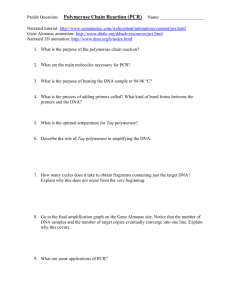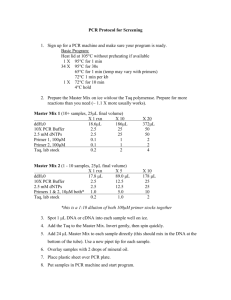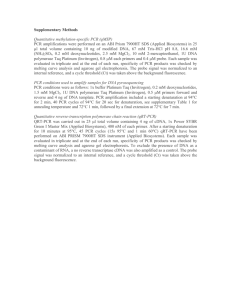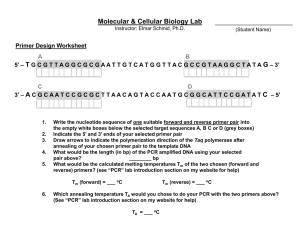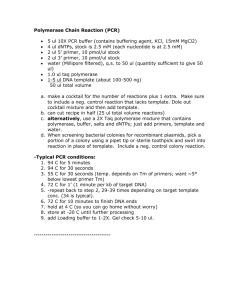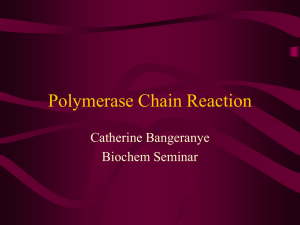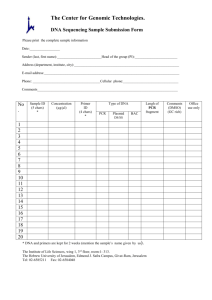Datasheet for Taq DNA Polymerase with Standard Taq Buffer
advertisement
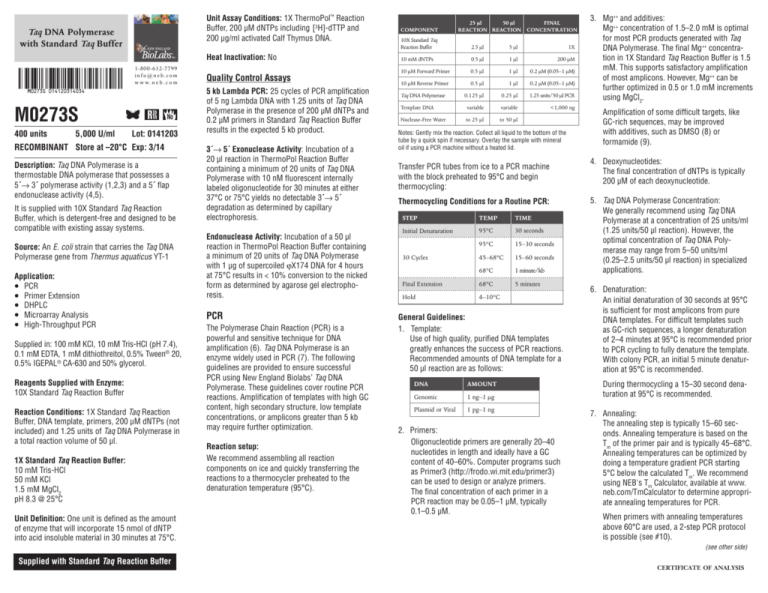
Taq DNA Polymerase with Standard Taq Buffer 1-800-632-7799 i n f o @ n e b. c o m w w w. n e b . c o m M0273S 014120314034 M0273S 400 units Brn 5,000 U/ml Lot: 0141203 RECOMBINANT Store at –20°C Exp: 3/14 Description: Taq DNA Polymerase is a thermostable DNA polymerase that possesses a 5´→ 3´ polymerase activity (1,2,3) and a 5´ flap endonuclease activity (4,5). It is supplied with 10X Standard Taq Reaction Buffer, which is detergent-free and designed to be compatible with existing assay systems. Source: An E. coli strain that carries the Taq DNA Polymerase gene from Thermus aquaticus YT-1 Application: •PCR • Primer Extension •DHPLC • Microarray Analysis • High-Throughput PCR Supplied in: 100 mM KCl, 10 mM Tris-HCl (pH 7.4), 0.1 mM EDTA, 1 mM dithiothreitol, 0.5% Tween® 20, 0.5% IGEPAL® CA-630 and 50% glycerol. Reagents Supplied with Enzyme: 10X Standard Taq Reaction Buffer Reaction Conditions: 1X Standard Taq Reaction Buffer, DNA template, primers, 200 µM dNTPs (not included) and 1.25 units of Taq DNA Polymerase in a total reaction volume of 50 µl. 1X Standard Taq Reaction Buffer: 10 mM Tris-HCl 50 mM KCl 1.5 mM MgCl2 pH 8.3 @ 25°C Unit Definition: One unit is defined as the amount of enzyme that will incorporate 15 nmol of dNTP into acid insoluble material in 30 minutes at 75°C. Unit Assay Conditions: 1X ThermoPol™ Reaction Buffer, 200 µM dNTPs including [3H]-dTTP and 200 µg/ml activated Calf Thymus DNA. COMPONENT 10X Standard Taq Reaction Buffer 2.5 µl 5 µl 1X Heat Inactivation: No 10 mM dNTPs 0.5 µl 1 µl 200 µM 10 µM Forward Primer 0.5 µl 1 µl 0.2 µM (0.05–1 µM) 10 µM Reverse Primer 0.5 µl 1 µl 0.2 µM (0.05–1 µM) Quality Control Assays 5 kb Lambda PCR: 25 cycles of PCR amplification of 5 ng Lambda DNA with 1.25 units of Taq DNA Polymerase in the presence of 200 µM dNTPs and 0.2 µM primers in Standard Taq Reaction Buffer results in the expected 5 kb product. 3´→ 5´ Exonuclease Activity: Incubation of a 20 µl reaction in ThermoPol Reaction Buffer containing a minimum of 20 units of Taq DNA Polymerase with 10 nM fluorescent internally labeled oligonucleotide for 30 minutes at either 37°C or 75°C yields no detectable 3´→ 5´ degradation as determined by capillary electrophoresis. Endonuclease Activity: Incubation of a 50 µl reaction in ThermoPol Reaction Buffer containing a minimum of 20 units of Taq DNA Polymerase with 1 µg of supercoiled φX174 DNA for 4 hours at 75°C results in < 10% conversion to the nicked form as determined by agarose gel electrophoresis. PCR The Polymerase Chain Reaction (PCR) is a powerful and sensitive technique for DNA amplification (6). Taq DNA Polymerase is an enzyme widely used in PCR (7). The following guidelines are provided to ensure successful PCR using New England Biolabs’ Taq DNA Polymerase. These guidelines cover routine PCR reactions. Amplification of templates with high GC content, high secondary structure, low template concentrations, or amplicons greater than 5 kb may require further optimization. Reaction setup: We recommend assembling all reaction components on ice and quickly transferring the reactions to a thermocycler preheated to the denaturation temperature (95°C). Taq DNA Polymerase 25 µl 50 µl FINAL REACTION REACTION CONCENTRATION 0.125 µl 0.25 µl 1.25 units/50 µl PCR Template DNA variable variable <1,000 ng Nuclease-Free Water to 25 µl to 50 µl 3.Mg++ and additives: Mg++ concentration of 1.5–2.0 mM is optimal for most PCR products generated with Taq DNA Polymerase. The final Mg++ concentration in 1X Standard Taq Reaction Buffer is 1.5 mM. This supports satisfactory amplification of most amplicons. However, Mg++ can be further optimized in 0.5 or 1.0 mM increments using MgCl2. Notes: Gently mix the reaction. Collect all liquid to the bottom of the tube by a quick spin if necessary. Overlay the sample with mineral oil if using a PCR machine without a heated lid. Transfer PCR tubes from ice to a PCR machine with the block preheated to 95°C and begin thermocycling: Thermocycling Conditions for a Routine PCR: STEP TEMP TIME Initial Denaturation 95°C 30 seconds 95°C 15–30 seconds 45–68°C 15–60 seconds 30 Cycles 68°C 1 minute/kb Final Extension 68°C 5 minutes Hold 4–10°C General Guidelines: 1.Template: Use of high quality, purified DNA templates greatly enhances the success of PCR reactions. Recommended amounts of DNA template for a 50 μl reaction are as follows: DNA AMOUNT Genomic 1 ng–1 μg Plasmid or Viral 1 pg–1 ng 2.Primers: Oligonucleotide primers are generally 20–40 nucleotides in length and ideally have a GC content of 40–60%. Computer programs such as Primer3 (http://frodo.wi.mit.edu/primer3) can be used to design or analyze primers. The final concentration of each primer in a PCR reaction may be 0.05–1 μM, typically 0.1–0.5 μM. Amplification of some difficult targets, like GC-rich sequences, may be improved with additives, such as DMSO (8) or formamide (9). 4.Deoxynucleotides: The final concentration of dNTPs is typically 200 μM of each deoxynucleotide. 5. Taq DNA Polymerase Concentration: We generally recommend using Taq DNA Polymerase at a concentration of 25 units/ml (1.25 units/50 μl reaction). However, the optimal concentration of Taq DNA Polymerase may range from 5–50 units/ml (0.25–2.5 units/50 μl reaction) in specialized applications. 6.Denaturation: An initial denaturation of 30 seconds at 95°C is sufficient for most amplicons from pure DNA templates. For difficult templates such as GC-rich sequences, a longer denaturation of 2–4 minutes at 95°C is recommended prior to PCR cycling to fully denature the template. With colony PCR, an initial 5 minute denaturation at 95°C is recommended. During thermocycling a 15–30 second denaturation at 95°C is recommended. 7.Annealing: The annealing step is typically 15–60 seconds. Annealing temperature is based on the Tm of the primer pair and is typically 45–68°C. Annealing temperatures can be optimized by doing a temperature gradient PCR starting 5°C below the calculated Tm. We recommend using NEB's Tm Calculator, available at www. neb.com/TmCalculator to determine appropriate annealing temperatures for PCR. When primers with annealing temperatures above 60°C are used, a 2-step PCR protocol is possible (see #10). (see other side) Supplied with Standard Taq Reaction Buffer CERTIFICATE OF ANALYSIS 8.Extension: The recommended extension temperature is 68°C. Extension times are generally 1 minute per kb. A final extension of 5 minutes at 68°C is recommended. Companion Products Sold Separately: Diluent F #B8006S 4.0 ml 9. Cycle number: Generally, 25–35 cycles yields sufficient product. Up to 45 cycles may be required to detect low-copy-number targets. Standard Taq (Mg-Free) Reaction Buffer Pack #B9015S 6.0 ml 10.2-step PCR: When primers with annealing temperatures above 60°C are used, a 2-step thermocycling protocol is possible. Taq PCR Kit #E5000S 200 Reactions Taq 2X Master Mix #M0270S #M0270L 100 Reactions 500 Reactions Thermocycling Conditions for a Routine 2-Step PCR: STEP TEMP TIME Initial Denaturation 95°C 30 seconds 95°C 15–30 seconds 60–68°C 1 minute/kb Final Extension 60–68°C 5 minutes Hold 4–10°C 30 Cycles 11.PCR product: The PCR products generated using Taq DNA Polymerase contain dA overhangs at the 3´–end; therefore the PCR products can be ligated to dT/dU-overhang vectors. References: 1. Chien, A., Edgar, D.B. and Trela, J.M. (1976) J. Bact., 127, 1550–1557. 2. Kaledin, A.S., Sliusarenko, A.G. and Gorodetskii, S.I. (1980) Biokhimiya, 45, 644-651. 3. Lawyer, F.C. et al. (1993) PCR Methods and Appl., 2, 275–287. 4. Longley, M.J., Bennett, S.E. and Mosbaugh D.W. (1990) Nucleic Acids Res., 18, 7317– 7322. 5. Lyamichev, V., Brow, M.A. and Dahlberg, J.E. (1993) Science, 260, 778–783. 6. Saiki R.K. et al. (1985) Science, 230, 1350– 1354. 7. Powell, L.M. et al. (1987) Cell, 50, 831–840. 8. Sun, Y., Hegamyer, G. and Colburn, N. (1993) Biotechniques, 15, 372–374. 9. Sarkar, G., Kapelner, S. and Sommer, S.S. (1990) Nucleic Acids Res., 18, 7465. Page 2 (M0273) Standard Taq Reaction Buffer Pack #B9014S 6.0 ml Magnesium Chloride (MgCl2) Solution #B9021S 6.0 ml Quick-Load® Taq 2X Master Mix #M0271S 100 Reactions #M0271L 500 Reactions Taq 5X Master Mix #M0285S #M0285L 100 Reactions 500 Reactions Deoxynucleotide Solution Set #N0446S 25 μmol each Deoxynucleotide Solution Mix #N0447S 8 μmol each #N0447L 40 μmol each QUICK-LOAD® is a registered trademark of New England Biolabs, Inc. THERMOPOL™ is a trademark of New England Biolabs, Inc. IGEPAL® is a registered trademark of Rhodia Operations. TWEEN® is a registered trademark of Uniqema Americas LLC. ISO 9001 ISO 14001 ISO 13485 Registered Registered Registered Quality Management Environmental Management Medical Devices
